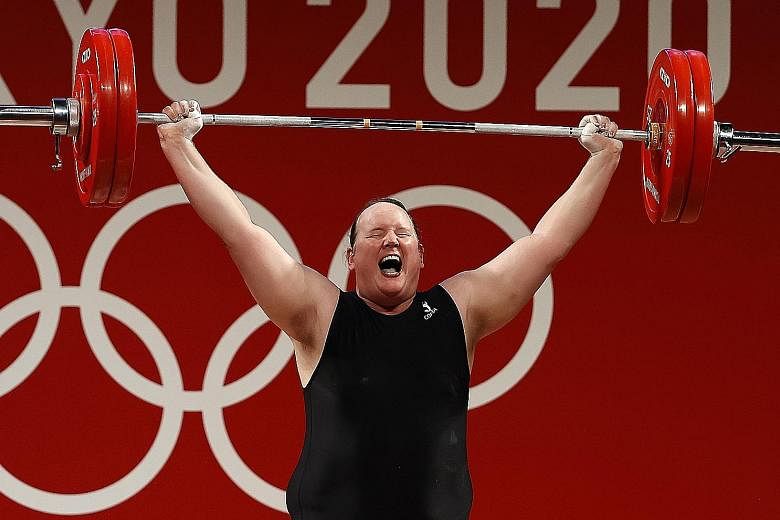TOKYO • Weightlifter Laurel Hubbard became the first transgender woman to compete at the Olympic Games yesterday, but her Tokyo dream was cut short when she crashed out of her final early.
The 43-year-old contested the women's +87kg category in a groundbreaking move Olympic chiefs said would make the Games more inclusive but critics feared would undermine women's sport.
The historic appearance lasted less than an hour as all three of Hubbard's snatch attempts failed.
The New Zealander dropped her first attempt at 120kg, increasing the weight to 125kg for her second only for the judges to disqualify the effort. Hubbard had one more chance at 125kg but could not hold on, making a heart gesture to the spectator-free Tokyo International Forum before bowing out.
World champion Li Wenwen won the +87kg event, making it a golden double for China after Wang Zhouyu, 27, triumphed in the 87kg, ahead of silver medallist Tamara Yajaira Salazar Arce of Ecuador and Dominican Republic bronze winner Crismery Dominga Santana Peguero.
The 21-year-old Li, who is the world record holder in the snatch, clean and jerk, and total, set three Olympic records, including 140kg - the heaviest weight she lifted in her third attempt.
She also hoisted a Games record of 180kg in the clean and jerk for a total of 320kg, with Britain's Emily Jade Campbell taking the silver and American Sarah Elizabeth Robles bronze as the Chinese weightlifting team won their seventh gold in eight categories.
The media-shy Hubbard made a swift exit from the arena after a brief statement, thanking Japan for hosting the Olympics in difficult circumstances.
She also expressed gratitude to the International Olympic Committee (IOC) and the International Weightlifting Federation (IWF) for supporting her campaign.
"Of course, I'm not totally unaware of the controversy that surrounds my participation in these Games," she said.
Hubbard competed as a man before transitioning to female in her 30s, taking up the sport again after meeting IOC guidelines on reduced testosterone for transgender athletes.
She became the first transgender Commonwealth Games athlete in 2018 and won silver at the 2017 world championships.
But her presence on sport's biggest stage in Tokyo has reignited debate about transgender athletes in women's sport, raising complex issues of bio-ethics, human rights, science, fairness and identity.
Critics argue Hubbard has an unfair advantage over female rivals due to physical attributes locked into her body during her formative years as a male.
While supporters say her appearance is a victory for inclusion and trans rights, and she received enthusiastic applause from the sprinkling of people in attendance, not all at the arena were so supportive.
Rival lifter Anna Vanbellinghen, who in the lead-up to the Games labelled Hubbard's participation "a bad joke", said she remained concerned it would result in less opportunities for female-born athletes.
"I stand by what I said previously," the Belgian insisted. "I do think we need to have a reorder of these rules."
But IWF spokesman Mike Cooper claimed Hubbard becoming an Olympian was a milestone for the sport.
The IOC will release new guidelines focusing on fairness, inclusion and safety after the Tokyo Games, but Vanbellinghen doubts there will be a definitive answer to the hot-potato topic.
AGENCE FRANCE-PRESSE, XINHUA

